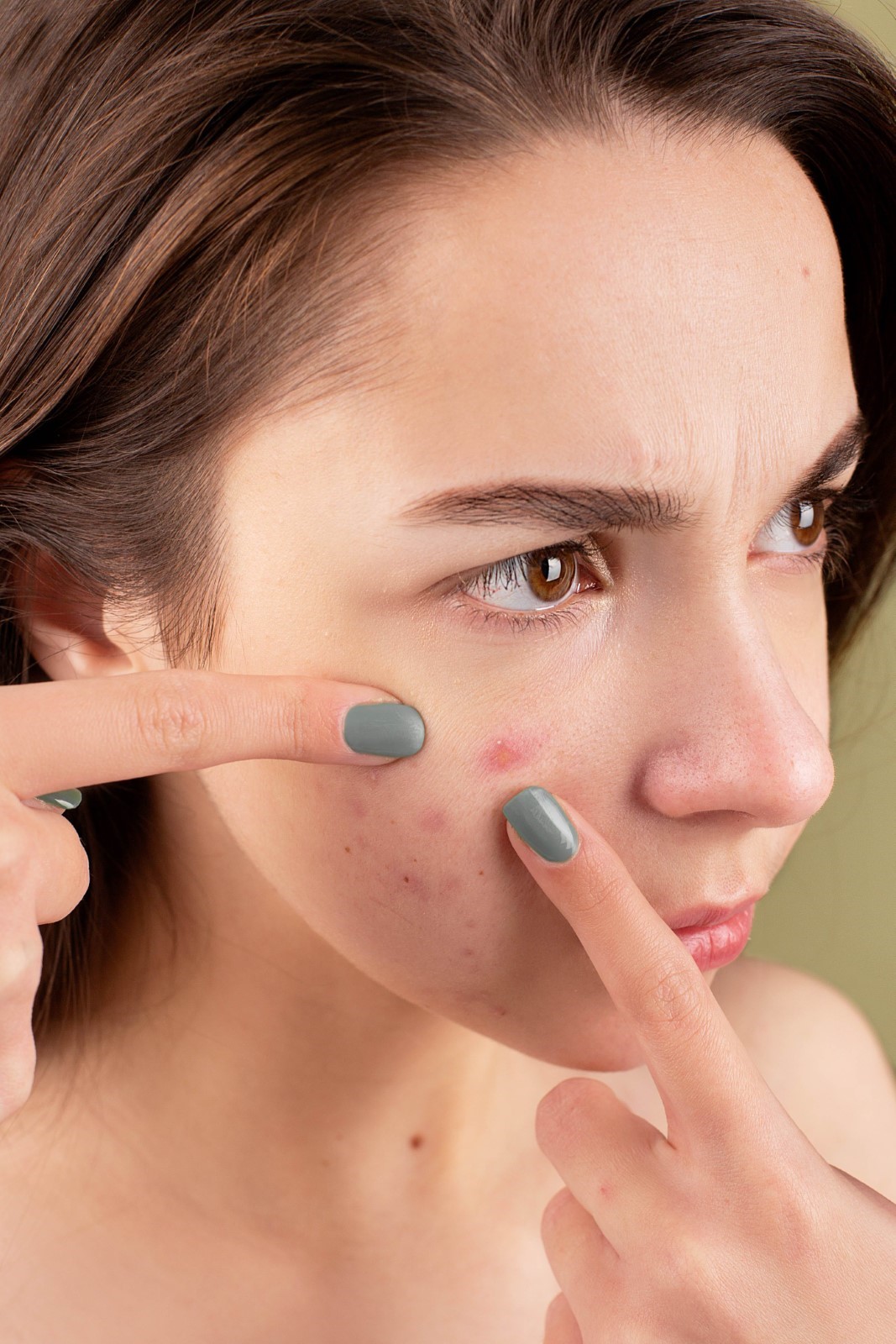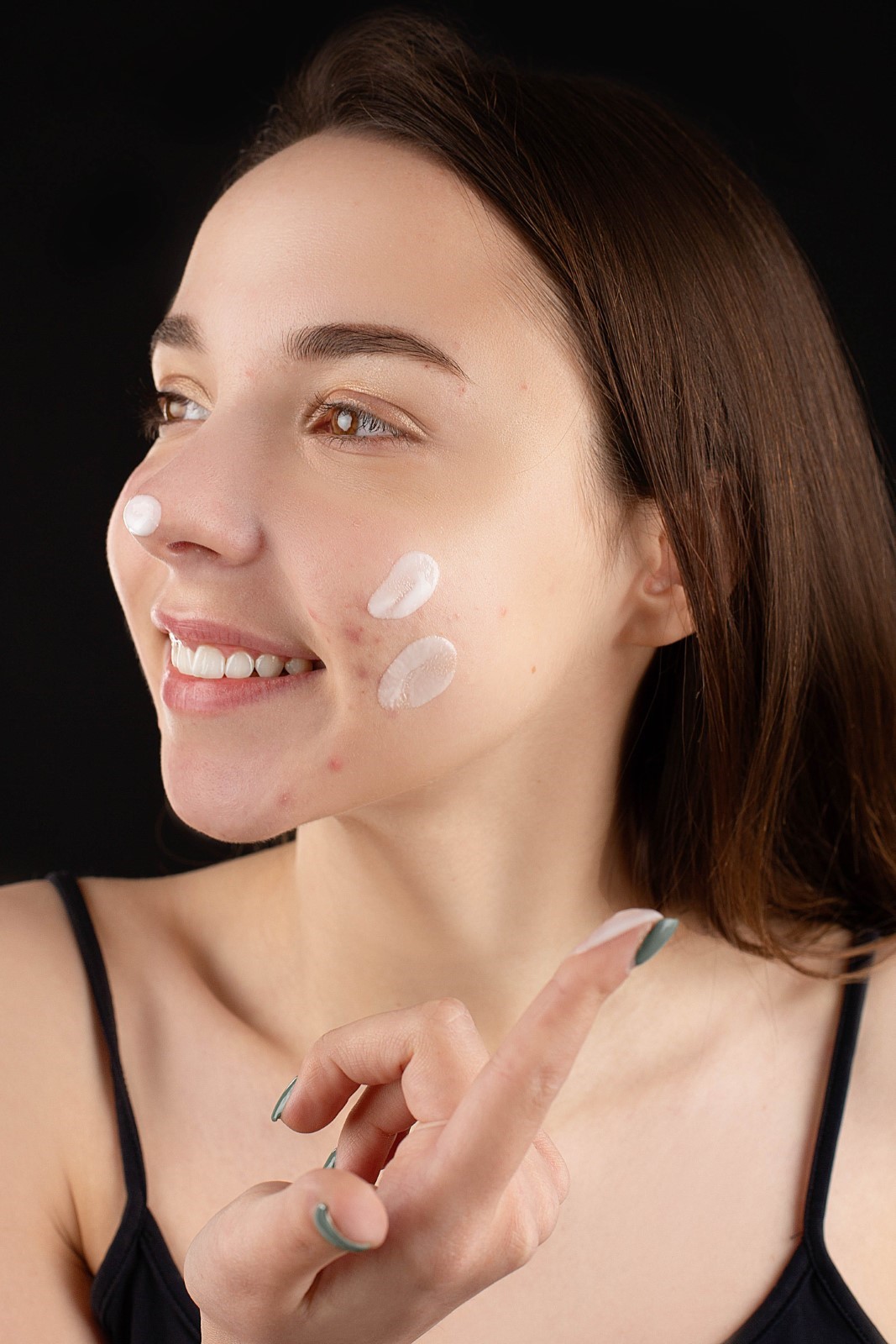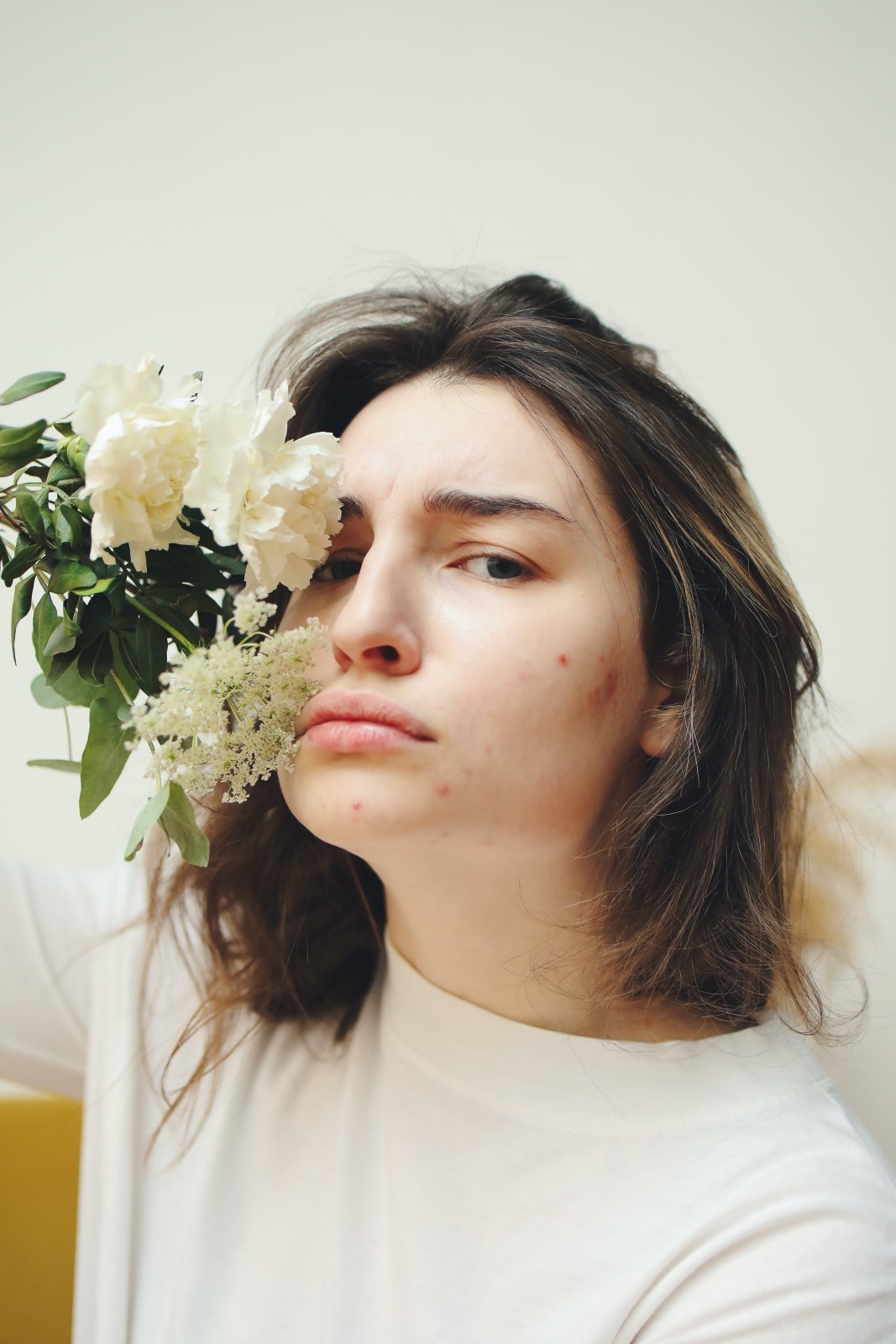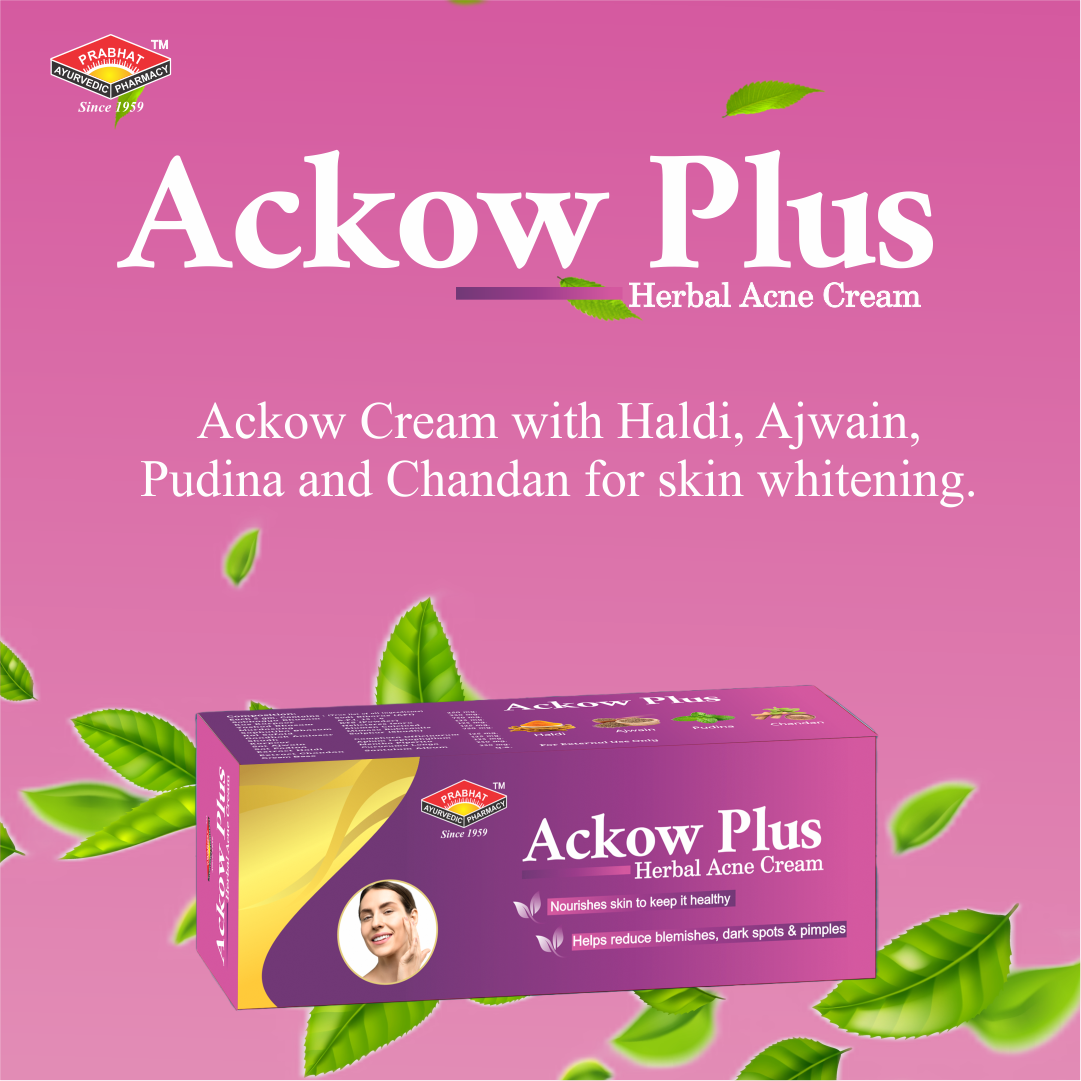What is Acne
Acne is a skin condition that occurs when the hair follicles under the skin become plugged with oil and dead skin cells. These plugs can trap bacteria and cause inflammation, resulting in various types of lesions on the skin, such as whiteheads, blackheads, papules, pustules, nodules, and cysts. Acne is most common among teenagers and young adults, but it can affect people of all ages and races. Acne usually appears on the face, but it can also affect the chest, back, and shoulders. Acne can range from mild to severe, and it can have a negative impact on the appearance, self-esteem, and quality of life of the affected individuals. Acne can also leave permanent scars on the skin if not treated early and appropriately. The exact causes of acne are not fully understood, but some of the factors that can influence its development and severity include hormones, genetics, diet, stress, and medications. Fortunately, there are many options for treating acne, depending on the type and severity of the condition. Some of the common treatments include topical medications, oral antibiotics, hormonal therapies, retinoids, and procedures such as chemical peels, light therapy, and extraction. If you suffer from acne, you should seek professional advice from a dermatologist or a skin specialist to determine the best treatment plan for your specific case.
Photo by Anna Nekrashevich: https://www.pexels.com/photo/woman-squeezing-her-pimples-with-her-fingers-6476081/
Why do pimples (acne) form? / What are the Causes of Acne? / Acne for Teens
Pimples are a common skin condition that affects many people, especially teenagers. Pimples form when the pores of the skin become clogged with oil, dead skin cells, bacteria, and other debris. When this happens, the skin becomes inflamed and red, and sometimes pus-filled bumps appear on the surface.
There are many factors that can contribute to the formation of pimples, such as:
- Hormonal changes: During puberty, pregnancy, menstruation, or menopause, the levels of hormones in the body fluctuate, which can stimulate the production of oil by the sebaceous glands in the skin.
- Genetics: Some people are more prone to developing pimples than others, due to their inherited skin type, sensitivity, or immune system.
- Diet: Certain foods, such as dairy products, chocolate, or greasy foods, may trigger or worsen pimples in some people, although the evidence for this is not conclusive.
- Stress: Stress can affect the immune system and the hormonal balance in the body, which can lead to inflammation and breakouts.
- Medications: Some drugs, such as steroids, lithium, or oral contraceptives, can cause pimples as a side effect.
- Cosmetics: Some products, such as makeup, moisturizers, or sunscreen, can clog the pores and cause pimples if they are not suitable for the skin type or not removed properly.
Pimples are not a serious health threat, but they can cause emotional distress and affect one's self-esteem. Therefore, it is important to treat them properly and prevent them from getting worse.
Some of the ways to do this are:
- Wash the face twice a day with a gentle cleanser and warm water. Avoid scrubbing or using harsh products that can irritate the skin.
- Apply a topical cream or gel that contains benzoyl peroxide, salicylic acid, or sulfur. These ingredients can help kill bacteria and reduce inflammation. Follow the directions on the label and use sparingly to avoid drying out the skin.
- Avoid popping or squeezing pimples. This can cause more inflammation, infection, scarring, and spreading of bacteria.
- Keep hair clean and away from the face. Hair can carry oil and dirt that can clog the pores and cause pimples.
- Change pillowcases and towels frequently. These items can accumulate bacteria and oil that can transfer to the skin.
- Drink plenty of water and eat a balanced diet. This can help hydrate the skin and provide essential nutrients for its health and repair.
- Reduce stress levels by practicing relaxation techniques, such as meditation, yoga, or breathing exercises. Stress can worsen pimples by affecting the immune system and the hormonal balance in the body.
If pimples are severe or do not respond to over-the-counter treatments, it may be necessary to consult a dermatologist. A dermatologist can prescribe stronger medications, such as antibiotics, retinoids, or isotretinoin. These drugs can have serious side effects and require close monitoring by a doctor.
Pimples are a common and frustrating problem that can affect anyone at any age. However, by understanding their causes and following some simple tips, one can prevent them from forming and treat them effectively.
What is the best treatment for pimples and acne? / What are some homemade remedies for acne? / What is best acne natural treatment?
Photo by Anna Nekrashevich: https://www.pexels.com/photo/woman-applying-facial-cream-6476079/
Besides using over-the-counter or prescription medications, there are also some natural remedies that can help treat pimples at home. Some of these are:
- Tea tree oil: Does tea tree oil really prevent acne? Yes, because this is a natural antiseptic and anti-inflammatory agent that can kill bacteria and reduce swelling. Apply a few drops of tea tree oil diluted with water or carrier oil (such as jojoba or almond oil) to the affected area with a cotton swab. Do this twice a day until the pimples heal.
- Aloe vera: This is a soothing and healing plant that can moisturize and calm the skin. Apply some fresh aloe vera gel or juice to the pimples and leave it on for 15 minutes. Rinse it off with water. Do this once or twice a day until the pimples disappear.
- Honey: This is a natural antibacterial and anti-inflammatory agent that can prevent infection and speed up healing. Apply some raw honey to the pimples and cover them with a bandage. Leave it on for an hour or overnight. Wash it off with warm water. Do this once a day until the pimples clear up.
- Lemon juice: This is a natural astringent and bleaching agent that can dry out and lighten the pimples. Squeeze some fresh lemon juice and apply it to the pimples with a cotton ball. Leave it on for 10 minutes or until it dries. Rinse it off with water. Do this once or twice a day until the pimples fade away.
- Apple cider vinegar: This is a natural acidic and antibacterial agent that can balance the pH of the skin and kill bacteria. Dilute some apple cider vinegar with water in a 1:3 ratio and apply it to the pimples with a cotton ball. Leave it on for 10 minutes or until it dries. Rinse it off with water. Do this once or twice a day until the pimples are gone.
These are some of the home remedies that can help treat pimples naturally and effectively. However, before using any of these remedies, make sure to do a patch test on a small area of skin to check for any allergic reactions. Also, avoid applying these remedies to open wounds or broken skin, as they may cause irritation or infection.
Pimples are a common and frustrating problem that can affect anyone at any age. However, by understanding their causes and following some simple tips, one can prevent them from forming and treat them naturally.
How Can I deal with Acne?
Photo by Polina Tankilevitch: https://www.pexels.com/photo/close-up-photo-of-woman-beside-a-white-flower-5588006/
Acne is a common skin condition that affects many people, especially teenagers and young adults. It can cause physical discomfort, such as pain, inflammation, and scarring, but it can also have a significant impact on one's psychological well-being. Acne can affect one's self-esteem, confidence, mood, and social relationships. In this blog post, we will explore some of the ways that acne can affect one's mental health and how to cope with it.
Acne and self-esteem
One of the most obvious ways that acne can affect one's mental health is by lowering one's self-esteem. Self-esteem is how we value ourselves and our abilities. It influences how we see ourselves and how we interact with others. People with acne may feel less attractive, less worthy, and less competent than others. They may also experience negative self-talk, such as "I'm ugly", "I'm disgusting", or "No one will like me". These thoughts can lead to feelings of shame, guilt, and depression.
Acne and confidence
Another way that acne can affect one's mental health is by reducing one's confidence. Confidence is how we trust ourselves and our abilities. It influences how we approach challenges and opportunities in life. People with acne may feel less confident in their appearance, their skills, and their potential. They may also avoid situations that expose their acne, such as social events, public speaking, or dating. This can lead to isolation, anxiety, and missed opportunities.
Acne and mood
A third way that acne can affect one's mental health is by influencing one's mood. Mood is how we feel emotionally at a given time. It influences how we perceive ourselves and our environment. People with acne may experience frequent mood swings, such as anger, sadness, frustration, or hopelessness. They may also have difficulty regulating their emotions and coping with stress. This can lead to irritability, aggression, or withdrawal.
How to cope with acne
Acne can have a negative impact on one's mental health, but there are ways to cope with it and improve one's well-being. Here are some tips:
- Seek professional help. If you have severe or persistent acne, you may benefit from seeing a dermatologist who can prescribe medication or other treatments to improve your skin condition. You may also benefit from seeing a therapist or counselor who can help you deal with the emotional aspects of acne and provide support and guidance.
- Practice self-care. Taking care of yourself physically and mentally can help you cope with acne and its effects. This includes eating a balanced diet, drinking enough water, getting enough sleep, exercising regularly, and managing stress. These habits can not only improve your skin health but also your mood and energy levels.
- Challenge negative thoughts. Acne can trigger negative thoughts about yourself and your situation, but you don't have to believe them. You can challenge them by asking yourself questions such as "Is this true?", "Is this helpful?", or "What evidence do I have?". You can also replace them with positive affirmations, such as "I'm beautiful", "I'm worthy", or "I'm capable".
- Focus on your strengths. Acne can make you focus on your flaws, but you have many qualities and talents that make you unique and valuable. You can remind yourself of your strengths by making a list of them or asking others for feedback. You can also use your strengths to pursue your goals and passions in life.
- Seek social support. Acne can make you feel alone or isolated, but you are not. You have people who care about you and support you, such as your family, friends, or peers. You can reach out to them for emotional support or practical advice. You can also join online or offline communities of people who share your experiences or interests.
How can one get rid of acne as quickly as possible? How can I get rid of my acne?
Acne can be frustrating and embarrassing, but there are ways to treat it and prevent it from getting worse. Here are some tips on how to get rid of acne as quickly as possible:
- Wash your face twice a day with a gentle cleanser that is suitable for your skin type. Avoid scrubbing or using harsh products that can irritate your skin and cause more inflammation. Rinse your face with lukewarm water and pat it dry with a clean towel.
- Use an over-the-counter (OTC) topical medication that contains benzoyl peroxide, salicylic acid, or sulfur. These ingredients can help kill the bacteria that cause acne, unclog the pores, and reduce the redness and swelling. Apply a thin layer of the medication to the affected areas after washing your face. Follow the directions on the label and do not use more than recommended.
- Avoid touching, picking, or popping your pimples. This can spread the bacteria to other areas of your skin and cause more infection and scarring. Instead, use a sterile needle or a comedone extractor to gently remove the pus from the pimples. Then apply an antiseptic cream or lotion to prevent infection and promote healing.
- Keep your hair clean and away from your face. Hair products such as shampoo, conditioner, gel, spray, or wax can clog your pores and trigger acne. Wash your hair regularly and use a mild or natural product that does not contain oil or alcohol. Tie your hair back or use a headband to keep it off your face.
- Change your pillowcase and towels frequently. These items can accumulate dirt, oil, bacteria, and sweat from your skin and hair. This can transfer to your face and cause more acne. Wash your pillowcase and towels at least once a week in hot water and detergent. Use a clean towel every time you wash your face.
- Avoid wearing makeup or use oil-free or non-comedogenic products. Makeup can clog your pores and worsen your acne. If you do wear makeup, choose products that are water-based, oil-free, or non-comedogenic (meaning they do not cause acne). Remove your makeup before going to bed and wash your face thoroughly.
- Eat a healthy diet and drink plenty of water. What you eat and drink can affect your skin health. Some foods that may trigger or aggravate acne include dairy products, refined carbohydrates, sugar, fried foods, chocolate, and caffeine. Try to eat more fruits, vegetables, whole grains, lean proteins, nuts, seeds, and healthy fats. These foods can provide essential nutrients and antioxidants for your skin. Drink at least eight glasses of water a day to keep your skin hydrated and flush out toxins.
- Manage your stress levels. Stress can increase the production of hormones such as cortisol and adrenaline that can stimulate the oil glands and cause more acne. Stress can also impair your immune system and make it harder for your skin to heal. To reduce stress, try to get enough sleep, exercise regularly, meditate, practice deep breathing, listen to music, or do something you enjoy.
- Consult a dermatologist if your acne is severe or does not improve with home remedies. A dermatologist is a doctor who specializes in skin conditions. He or she can prescribe stronger medications such as antibiotics, retinoids, oral contraceptives, or isotretinoin that can treat severe or persistent acne. A dermatologist can also perform procedures such as chemical peels, laser therapy, microdermabrasion, or cortisone injections that can improve the appearance of your skin and reduce scarring.
What are some creams that are available in India?
There are many products available on the market to deal with acne, but we recommend using Ackow Plus Ointment that is made from all natural ingredients that deal with acne gently and does not harm the skin.
How Do I remove Acne Scars
Although there is no straightforward way to remove scars from acne but we have discussed ways where further damage can be controlled. . To read more about it please visit our blog dedicated to this topic





